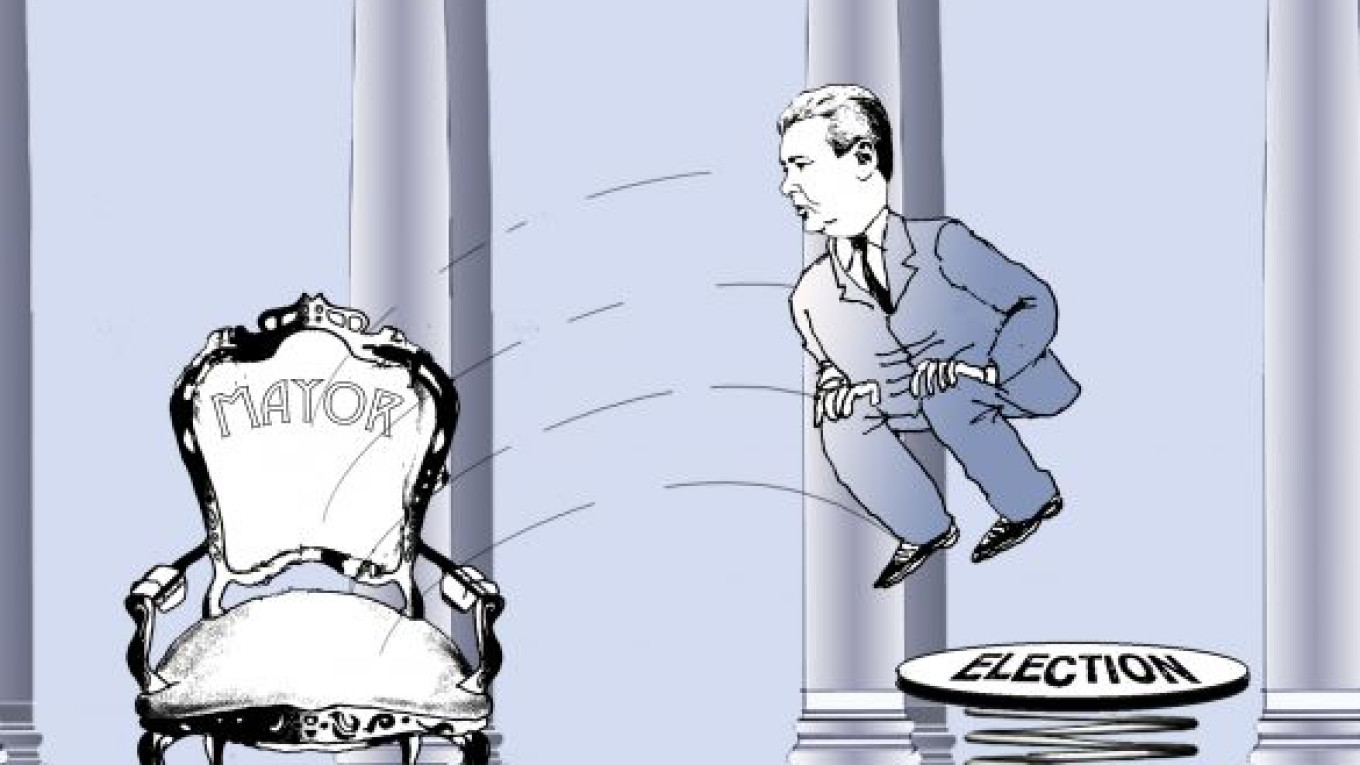Mayor Sergei Sobyanin caught many by surprise when he resigned on June 5 and called for early elections. Russian law allows the mayor to resign and run again for the same office if the president gives his approval. Of course, President Vladimir Putin was willing to play along. Of course, it would be impossible to pull such a stunt without the express approval from the Kremlin ahead of time.
As recently as a few months ago, Sobyanin told journalists that he would not call an early election before his current term expires in 2015. He said that Muscovites "don't need politics" and that he intended to continue working diligently at his job without going to all the fuss and expense of an election campaign. His arguments were typical of ruling officials who feel no special reverence for all the "fuss and bother" of electoral democracy. At the same time, his inner circle has long been talking about the possibility of holding early elections.
The discontent over Sobyanin's poorly conceived projects might increase, and the Kremlin wants to avoid disgruntled Muscovites from turning the mayoral election into a no-confidence vote for the federal government.
In terms of political tactics, Sobyanin is doing exactly the right thing. After all, early elections are useful for politicians at the peak of their popularity or who anticipate that, for one reason or another, their ratings might sharply decline in the foreseeable future.
Not long before Sobyanin's decision, a poll was conducted asking Muscovites who they would vote for if a mayoral election were held in the near future. About half said they would vote for Sobyanin, whereas potential rival candidates such as Civil Platform party head Mikhail Prokhorov, Yabloko party head Sergei Mitrokhin, Left Front leader Sergei Udaltsov and anti-corruption blogger Alexei Navalny would each garner far less than 10 percent of the vote.
If the gap between Sobyanin and his rivals is so large, why is he in such a rush to hold an early election? There are several theories. First, if an election was held according to schedule in 2015, Prokhorov would be able to mount a serious campaign. But by September, Prokhorov —? nor anyone else for that matter — can do anything serious to challenge Sobyanin. Even if he had two years to prepare for the Moscow race, it might not be enough. After all, Prokhorov has done little to distinguish himself as a politician over the last year. He offered practically no public reaction to sometimes dramatic events unfolding in Russia and has not managed to create a comprehensive platform, particularly with regard to what is happening in Moscow's economy. The result is that Prokhorov might fare worse in a race against Sobyanin than he did during the presidential elections of 2012.
Basically the same applies to Navalny. He has done little to establish his name over the past year besides exposing corrupt government officials on the Internet. Voters need a broader platform, and those in Moscow expect a vision for how the candidate would improve life in the capital.
Second, Sobyanin might have called an early election out of fear that his ratings could fall considerably by 2015. He has implemented a number of initiatives in Moscow that might produce a backlash in the next two years. For example, his new system of paid parking in Moscow is not the most popular decision among Muscovites. Sobyanin has also launched major road construction projects that will mean multi-lane highways passing outside their windows. In addition, dedicated lanes for public transportation have irritated motorists, as have the large fines for drivers who dip into these lanes.
The discontent over such poorly conceived projects might increase with time, and the Kremlin wants to avoid disgruntled Muscovites from turning the mayoral election into a no-confidence vote for the federal government. It is far better for Moscow to hold elections in Moscow now when the opposition is weakened and no massive street protests are planned, than in 2015, when the political situation might change considerably. A third good reason to hold an early mayoral election on Sept. 8 is that elections will also be held in the Moscow region on this day, and fellow United Russia candidate Andrei Vorobyov is expected to win in those. Sobyanin, who is no worse than Vorobyov, could achieve a similar victory. Passing through the gauntlet of an election would significantly increase Sobyanin's political clout and might position him to either become a candidate to succeed Putin in 2018, or to replace Dmitry Medvedev as prime minister once Putin finally decides to get rid of him. Of course, none of these maneuverings have any connection whatsoever to electoral democracy: They are simply the outcome of Putin's personal desires.
Georgy Bovt is a political analyst.
A Message from The Moscow Times:
Dear readers,
We are facing unprecedented challenges. Russia's Prosecutor General's Office has designated The Moscow Times as an "undesirable" organization, criminalizing our work and putting our staff at risk of prosecution. This follows our earlier unjust labeling as a "foreign agent."
These actions are direct attempts to silence independent journalism in Russia. The authorities claim our work "discredits the decisions of the Russian leadership." We see things differently: we strive to provide accurate, unbiased reporting on Russia.
We, the journalists of The Moscow Times, refuse to be silenced. But to continue our work, we need your help.
Your support, no matter how small, makes a world of difference. If you can, please support us monthly starting from just $2. It's quick to set up, and every contribution makes a significant impact.
By supporting The Moscow Times, you're defending open, independent journalism in the face of repression. Thank you for standing with us.
Remind me later.


